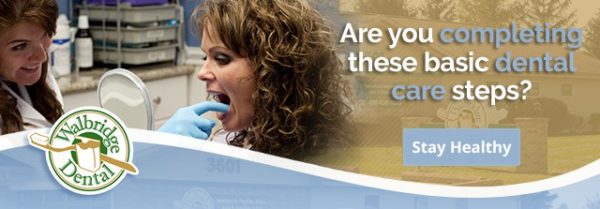
Thousands of teeth are lost every year to gum disease and injury. While tooth loss during early childhood is normal, the loss of your permanent teeth can severely impact your oral health. Missing teeth can have a domino effect of health issues on your mouth – resulting in far more long-term damage than just around the original tooth. Read on to learn about the damaging effects of ignoring a missing tooth in adulthood.
What Can Cause Missing Teeth?
For most, tooth loss is associated with growing through childhood. However, adults can easily lose their teeth too! Losing a tooth can happen in a variety of ways, but these are the most common:
Injury
Accidents and injuries are a very common source of sudden tooth loss. Upwards of five million teeth are knocked completely from their socket every year – and up to 40 percent of those can be attributed to athletic injuries.
A single impact that strikes the mouth can do enough damage to dislodge a tooth permanently. While mouth guards are an excellent defense against sports injuries, they’re not perfect. In some cases, poorly-fitting mouth guards offer little to no protection.
More commonly, however, are injuries during non-contact sports where athletes aren’t required to wear sports guards at all. Basketball, for instance, has an extremely high-rate of orofacial injury and many participants don’t wear mouth protection at all!
Gum Disease & Tooth Decay
If you don’t take gum disease and tooth decay seriously, you should! They’re two of the most likely ways that you may eventually encounter tooth loss. Once they’ve advanced far enough, they can cause a permanent loss of one or more teeth that is irreversible, though not untreatable.
Periodontitis, or severe gum disease, can progress painlessly even into its late stages. That means that without proper dental care and regular visits to your dentist, you could be nearing the loss of your teeth without even knowing!
When you begin to suffer from periodontitis, the inner layer of your bone and gums begin to recede from your teeth. Not only can these pockets become infected, they will eventually cause your tooth to become loose. Over time, your gums will be unable to support the affected teeth, and they will fall out or need to be extracted.
The Major Long-Term Effects of Missing Teeth
Some believe that the loss of a tooth is the “final” consequence of injury or poor dental care. However, the long-term effects of missing teeth extend far beyond the tooth itself.
Shifting Teeth
The positioning of your teeth is not set in stone – which is good news for those that undergo orthodontic treatment to improve their smile! However, it’s not so good for those that choose not to replace a missing a tooth.
When a lost tooth is left untreated, the rest of your teeth will shift due to the new gap. Your teeth will drift to close that gap, creating a crooked look.
The issue with shifting teeth is far more than cosmetic, too. Crooked teeth impact the quality of your bite, which can make everything from chewing to talking more difficult. The new, unusual pressure that your teeth may experience can even make the more susceptible to fracturing.
Periodontal Disease
While periodontal disease is often the cause for tooth loss, it can go the other way too! The large gap left behind from your missing tooth is the perfect place for bacteria to hide and thrive. And without a clear tooth to brush or floss, it becomes more difficult for you to keep that area clean.
Bacteria will continue to multiply from this gap at an alarming rate. Not only will it spread into the gums, inflaming them and leading to advanced gum disease, but it will also spread to nearby teeth. As teeth shift to fill in the gap, existing bacteria can become safeguarded from your attempts to brush or floss them away.
The end-result is a worsening of your gum disease and increased tooth decay in your mouth.
Bone Loss
Not unlike muscles, bones can become weakened when unused. The bones in your mouth help you retain the overall shape of your jaw, as well as the motion for chewing or speaking.
Lost teeth can cause the bones in your mouth to weaken and become less dense. Over time, the bone loss will affect the shape of your entire lower jaw. The chin will shift upward and angle slightly to point more forward. Your mouth’s width will also decrease.
This bone loss is often associated with denture use – as dentures aren’t perfect replacements for lost teeth. However, the damage to your bones will happen more rapidly when you do nothing to help stimulate the bone in the area around your lost tooth.
TMJ
Shifting teeth and bone loss also dramatically increase the likelihood of experiencing temporomandibular joint and muscle disorder, also known as TMJ. This painful condition is caused by damage or dysfunction of the muscles or joints that are used to control your jaw.
When your jaw begins to shift, the upper and lower parts of your may cease to fit together properly. This awkward positioning will increase strain that leads to, or worsens, a TMJ disorder.
The Momentum of Tooth Loss
One of the most significant problems associated with tooth loss is the momentum it builds. When you lose one tooth, the increase in decay, bone loss and gum disease will quickly spread throughout your mouth. As this happens, nearby teeth are at risk for being lost as well. This problem will continue until the underlying causes are treated and the lost teeth replaced.
Of all the effects of tooth loss, this potential for losing most of your teeth is one of the most dangerous. Once it begins, without intervention, more teeth can be lost very quickly. That’s why it’s important to regularly visit your dentist and alert them to any concerns you may have about chronic gum disease or decay!
How Your Dentist Can Help with Missing Teeth
When you have a missing tooth, you have a few options available to prevent further damage to your smile. Your dentist will recommend the most viable option for you from these choices:
Dental Implant – Modern implants are used to replace the tooth all the way at the root. In addition to replacing your tooth, it is anchored into the bone. This helps resist bone loss and makes the implant very good at simulating a natural tooth.
Bridge – Unlike implants, bridges are placed using the adjacent teeth as anchor points. They’re less expensive than implants but also don’t last as long.
Dentures – If you’re missing most or all of your teeth, dentures can be a more affordable option. Available as complete or partial dentures, they replace both teeth and gum tissue.
Contact Walbridge Dental
Are you missing one or more teeth? We can help! The professionals at Walbridge Dental provide complete family dental care to families in the Millbury community. Contact us online to set up an appointment now or call us at 419-836-1033.
Connect on Social Media!

